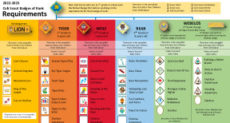 Our troop has experienced a rash of Eagle Scout activity in recent months, the most recent of which was an Eagle Court of Honor on Sunday in which the 48th Eagle Scout in our troop’s 30-year history received his medal and his charge. We have two more Eagles who have completed their boards of review and are awaiting their courts of honor, another with a project completed and two more whose projects have been approved. The uptick in activity is the result of a successful recruiting drive six years ago that resulted in a dozen crossovers, almost all of whom have stayed with the troop. Successive waves of recruiting in the years that followed nearly tripled the size of our troop.
Our troop has experienced a rash of Eagle Scout activity in recent months, the most recent of which was an Eagle Court of Honor on Sunday in which the 48th Eagle Scout in our troop’s 30-year history received his medal and his charge. We have two more Eagles who have completed their boards of review and are awaiting their courts of honor, another with a project completed and two more whose projects have been approved. The uptick in activity is the result of a successful recruiting drive six years ago that resulted in a dozen crossovers, almost all of whom have stayed with the troop. Successive waves of recruiting in the years that followed nearly tripled the size of our troop.
I had the privilege and honor of sitting on his board of review, and something he said during the enjoyable conversation caused me to make a connection to the true meaning of Scout.
Most of us know that the modern Scouting movement is based on the writings and teachings of Robert Baden-Powell. B-P was a military hero who commanded British forces in the Boer War, and in the process developed methods for soldiers to learn about the enemy by observing clues to their movements and whereabouts. He put his findings in writing in a military manual titled Aids to Scouting for NCOs and Men. His early version of scouting was different from what we know today in our movement, for it was based on military applications such as finding one’s way in strange countryside, using the senses to observe everything around, concealing oneself from the enemy, following tracks and reading their meaning. British boys got hold of this plain-language manual and began playing games based on Baden-Powell’s advice to military scouts. As a result of this reappropriation of military resources for civilian use, he began working to develop the Boy Scout program that we now know the world over.
But just what is a “scout” in B-P’s early terminology and how does it tie in with today’s movement?
A search for the etymology of the word “scout” takes us back to the Latin word escoultare meaning “to listen or give heed to”. In old France around 1300, the word became escouter and we now know it in modern French as écouter meaning “to listen”. Simply put, military scouts were experts at listening and heeding the signs, signals and senses all around them. The image one conjures up is of the Indians of the wild west putting ears to the ground to listen for the thumping of horses’ hooves indicating the approach of the invading white men.
The term “scout” morphed from the military meaning into the present-day youth Scouting program, but there are many similarities between the scouts of Baden-Powell’s armies and our youth program of today. Beyond the obvious applications of the powers of observation, such as recognizing and following animal tracks, identifying native plants, finding direction by the stars at night or using cloud patterns to foretell changes in weather, we also find the act of listening and observing thoroughly ingrained in our collective experience today.
- Scouts listen to one another as they teach and learn the skills they need to know in order to get along in the outdoors.
- Youth leaders listen to the members of their patrols, conveying that information to the patrol leaders’ council. They listen to the council and bring that information back to their patrols.
- Scouts listen to their adult leaders, pondering the questions and situations they impose and strive to understand the course of action indicated as their response.
- The Scoutmaster listens closely to what his Scouts are telling him, not just verbally but by observing their interactions. A savvy Scoutmaster can tell how a patrol is functioning by watching their actions and listening to their conversations (or noise level).
- Committee members can carefully listen to what a Scout says, and how he says it, during a board of review, and determine not only how the Scout’s experience is, but gain an assessment of the general direction of the troop and its leadership.
- As I realized at the Eagle board of review, listening carefully to the observations of an experienced Scout can help us to better understand whether the values of the Scout Oath and Scout Law are being instilled, and what can be done to guide the troop to improving the experience for everyone.
So next time you consider the word Scout, think about where it comes from and remember that listening is one of the most important aspects of our program.
Image courtesy of Danilo Rizzutti / FreeDigitalPhotos.net
This post first appeared on Bobwhite Blather.




Great article! I don’t know a lot about B-P, so it was interesting to learn about him. You did a very nice job with the analogy between Scouting roots and today’s Scouting.